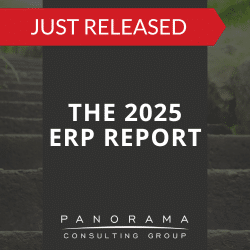What are the primary business benefits of an erp system? The path to ERP implementation success begins with an understanding of the business value of enterprise resource planning (ERP) system software.
The Business Value of ERP System Software is Demonstrated in These 9 Benefits
1. Increased Efficiency and Productivity
One of the primary benefits of an ERP system stems from its ability to integrate business processes and data into a single database.
For example, the accounting team can access real-time sales numbers with a single click, instead of waiting for the sales department to send them this data. This also means that the same data doesn’t need to be manually entered by both an accounting team member and a sales team member.
The 2025 Top 10 ERP Systems Report
What vendors are you considering for your ERP implementation? This list is a helpful starting point.
2. Improved Data Accuracy
An ERP system also helps to improve data accuracy. Most ERP solutions have real-time data capabilities, meaning that data is consistent across various software platforms as it’s updated automatically. A single source of truth leads to better-informed decisions and eliminates the possibility of costly errors.
3. Improved Customer Satisfaction
An ERP solution can improve customer satisfaction by streamlining order processing and reducing lead times. Another way that ERP software delights customers is by increasing data accessibility. For instance, companies can provide a higher level of service by implementing technology that enables customers to receive automatic order updates and allows them to solve issues in a self-service portal rather than waiting on-hold listening to classical music.
4. Reduced Costs
While an ERP implementation may require a large upfront investment, the right technology can save an organization money in the long run. Many of these savings come in the form of increased efficiency. That one is obvious. What organizations may not realize is that an ERP system can help them eliminate some (or all) of their legacy systems, thus consolidating their IT expenditures. No one wants to pay multiple maintenance or subscription fees.
5. Supply Chain Optimization
ERP systems can improve supply chain visibility by providing real-time data on order status, inventory levels, and more. Organizations can use this data to make informed decisions and reduce the risk of stock shortages or overstocking.
6. Improved Project Management
Companies in the professional services industry can benefit from a centralized platform for tracking project progress, managing resources, and communicating with stakeholders. For example, real-time information on resource utilization and availability helps organizations better allocate their resources and optimize project budgets.
7. Improved Compliance
ERP systems can help organizations comply with various regulations and standards. In general, most industries require a centralized platform for recording and reporting information, such as financial reporting and employee records. A single platform makes data security easier to manage, which reduces the risk of data breaches and ensures the confidentiality of information.
8. Flexibility and Scalability
Over time, organizations grow, and market conditions change. Adapting to either of these shifts requires a modern ERP solution. The top ERP systems allow organizations to easily adjust their processes and systems as their needs change. This makes it easier to adapt to new business requirements and continuously improve processes.
9. Improved Talent Management
ERP systems help people managers perform core HR processes as well as recruiting, onboarding, performance management, and more. A tangential benefit is that modern technology, in general, increases employee retention because it gives them a reason to stick around (Millennials and Generation Z want nothing to do with “green screens.”)
How to Maximize Your ERP ROI
The business value of ERP systems is clear. However, these benefits are not guaranteed. To maximize your ROI from an ERP system, it is important to choose the right system for your business. This requires a thorough understanding of your business processes and organizational goals.
Successful ERP selection also entails careful consideration of the following factors:
- Cost: Consider the total cost of ownership when choosing an ERP system, including software, hardware, and implementation costs.
- Scalability: Choose an ERP system that can grow with your business and meet future needs.
- Integration: Consider how the ERP system will integrate with your existing systems and processes.
- User-friendliness: Choose an ERP system that is user-friendly, so that employees can easily adopt and use the system.
- Support: Consider the level of support that is available, both during and after implementation.
Once you have selected the right ERP system, it is important to ensure that it is implemented properly. This requires careful planning and collaboration between IT and business teams. Learn more about ERP implementation in our post, “KPIs for ERP Implementation.”
If you have any questions about ERP business benefits, selection, or implementation, contact our ERP consultants below for a free consultation.













